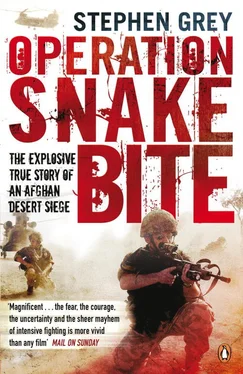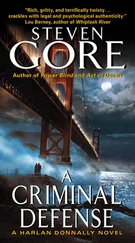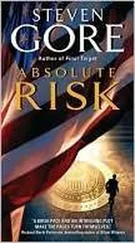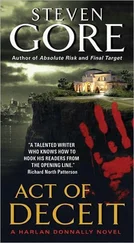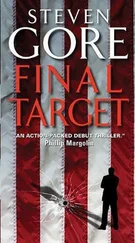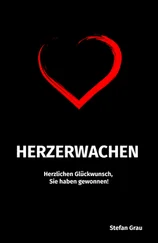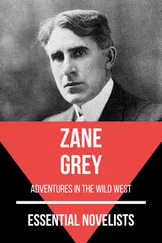Bellingham climbed back up top and looked forward, and then he saw the driver, Lance-Corporal Christopher Fletcher. He was halfway up the hill with blood on his face and his arms were badly cut. And there was blood coming from his mouth. He put his hand up and his lips were moving, like he was shouting for help but Bellingham couldn’t hear him at all.
Just then Cagey appeared, clambering over on to the roof of the Vector from the Bedford truck. The Vector had slid back down the slope with a squeak after the explosion and had come to rest against the truck. That must have been the ‘thud’ that Bellingham felt. His hearing came back now all of a sudden. He heard Cagey say, ‘Is everyone all right?’ Bellingham said, ‘I can’t see Jonno. I can’t get to Jonno.’ Both of them leaned over the top of the cab and tried to prise Jonno’s door open, but it was mangled. Then they sat on the roof and tried to kick open the driver’s door, which was slightly ajar. It didn’t work. Cagey went off to get Andy, the special forces medic.
Bellingham thought, ‘Fuck it! and jumped on the ground by the driver’s side and managed to get the door open, clearing away the rubble and dirt inside. He remembered: ‘The first thing I noticed there’s no steering wheel, it was just black inside. It was like something went through and just left the outer shell, ripping it to shreds inside. He crawled through towards Jonno, but when he saw him his heart almost stopped. Bellingham knew instantly what had happened when he opened Jonno’s eyelids and he saw only darkness. But it wasn’t his job to declare anyone dead. He just did what his training said: applied two tourniquets to stem the flow of blood from his torso and tried to cut some of his clothes away to check out his injuries. By now Hughes, the medic, had climbed in too. They could tell instantly there was no life left. Both of Jonno’s legs had been amputated in the blast. No one could survive that. Jonno must have died instantaneously. He had felt no pain.
Bellingham got out of the vehicle with blood on his clothes. By now the chopper was in and flying out the other casualties.
How did he recall that day later? ‘The weather was, you know, cold and miserable in the morning. In the afternoon it got hot. And it was that sort of day where you’re hungry, you’re tired, you just want to get back to the camp, get a hot shower, get a beer and stuff like that. And Jonno just turned around and said, “No, I don’t like today, something’s going to happen,” and you know, for him, it did.’
Of the mine blast, Hughes, the medic, would remember only a big bang and smoke and dust. Then he was flying forward on to the ammunition boxes. He also remembered him and Lee stopping Tawfiq, the interpreter, from getting out the back. Then he was sifting through the bags trying to find his medical kit and trying to see in the front. He could see that Jonno was there, but it was too narrow to get through. He took his bag and climbed on to the roof. He was still looking for Fletch, the driver, but saw him being helped up the hill, bleeding. Hughes clambered over the Bedford truck and got to Fletcher. But by then another medic had arrived, so Hughes turned back and clambered again over the truck back into the back of the Vector to try to reach Jonno. He managed to dig a path through the bags and boxes, and by then Lee Bellingham was already in the front.
‘We were talking because I wasn’t in a position to manoeuvre around Jonno, whereas Lee was.’ Hughes got Bellingham to check the vital signs, like his pulse and breathing. There were no signs at all. They were preparing to leave as Andy, the American SF medic, jumped in.
‘How is he?’ said Andy.
‘He’s not with us.’
‘Right then, let’s go.’
That was how the scene ended, although it stayed in Hughes’ mind for months. Those two days – the nightmare in the village and then the blast and finding Jonno dead – were about the worst he could think of. Months later he was getting counselling from the army’s welfare team. ‘I still think about it now,’ he told me back in England. ‘There’s some times when I just can’t sleep or there’s some times when I think about it so bad I get myself worked up.’ Hughes never spoke to his family about it. It was all too much.
In the desert above, when Jake heard the mine blast, he thought at first maybe Nick Mantell had ‘denied’ the truck (blown it up and denied it to the enemy). But he felt his stomach churn nevertheless, felt unease.
He sped back through the desert. At his side, as always, was one of Jonno’s best friends, Dave McCarrick on the .50 cal, and David Percival, his driver.
On his personal radio Jake could hear now it was a mine strike. And as he approached he could see it was a Vector, Jonno’s Vector. He wanted to get down quickly and see what had happened and how everyone was. Mantell knew what Jake wanted but knew he had to stop it. There was no gentle way of doing it.
‘Jake. Jonno’s dead,’ he said.
Jake still wanted to go down there. But Mantell said he had stopped everyone going. It might be a minefield. Jake nodded.
Most of B Company spent the rest of the day up on the ridgeline. All day Mantell wondered if he could have done anything differently, if there could have been a way to save Jonno. But he knew deep down there was nothing. It was just sad and unlucky. B Company were waiting for a chopper to bring a bomb-disposal team in to clear the minefield so Jonno’s body could be taken away safely and the Afghan truck recovered or blown up. But the helicopters never came.
Emergency landing zone beneath Roshan Tower, with Alpha Company, 1 Fury, 11.00
The paratroopers wanted the chopper in fast. They feared the injured Brasher could die through blood loss, and they knew the JDAMs couldn’t be dropped while the helicopters were around.
Eventually a British Chinook showed up, but the message came through: ‘We’re not landing. It’s too hot.’
‘Hey, what do you want me to do? Let this guy bleed out?’ replied Shane Summers, who was in charge of the evacuation. He was told to move the landing zone.
‘We can’t fucking move, and this guy’s fucking dying. So are you coming in or not?’ was what the Chinook pilots heard of his reply.
The Americans knew they were lying about the landing zone’s security. The helicopters, who knew there was a battle going on, were saying, ‘This place in not secured,’ and Summers was saying, ‘Yeah, it is secured.’ It wasn’t a blatant lie. It was true the actual 100-yard strip where the helicopter would land was secure. But they had to skew the data a bit. Right in front were the Taliban positions, and Musa Qala wadi and the town itself were right in sight – and right in range.
The pilot on the circling Chinook was Nichol Benzie – the same man who had landed under contact for the Royal Marines outside Inkerman on 9 November. In the back of the Chinook were the two injured they had just picked up from the mine strike that killed Jonno. Benzie and his co-pilot made the decision to come in. The last 30 feet of descent were as blind as usual, descending through the brown-out of dust and flying rocks. When their vision cleared, the pilots looked straight ahead and realized there was nothing between them and Musa Qala and their enemy.
Summers took the injured round the back of the chopper. Brasher’s pain kept him angry. The other injured soldier, Lee, watched as a medic rushed out to help Brasher – and Brasher stiff-armed him aside with his good arm, knocking the medic on to his backside. As they flew off, Lee knew his friend was still in a bad way and he was worried they were paying attention to him and not Brasher. ‘That was a fun ride,’ remembered Lee. ‘Me, messed up on morphine, cussing out some people.’
Читать дальше
